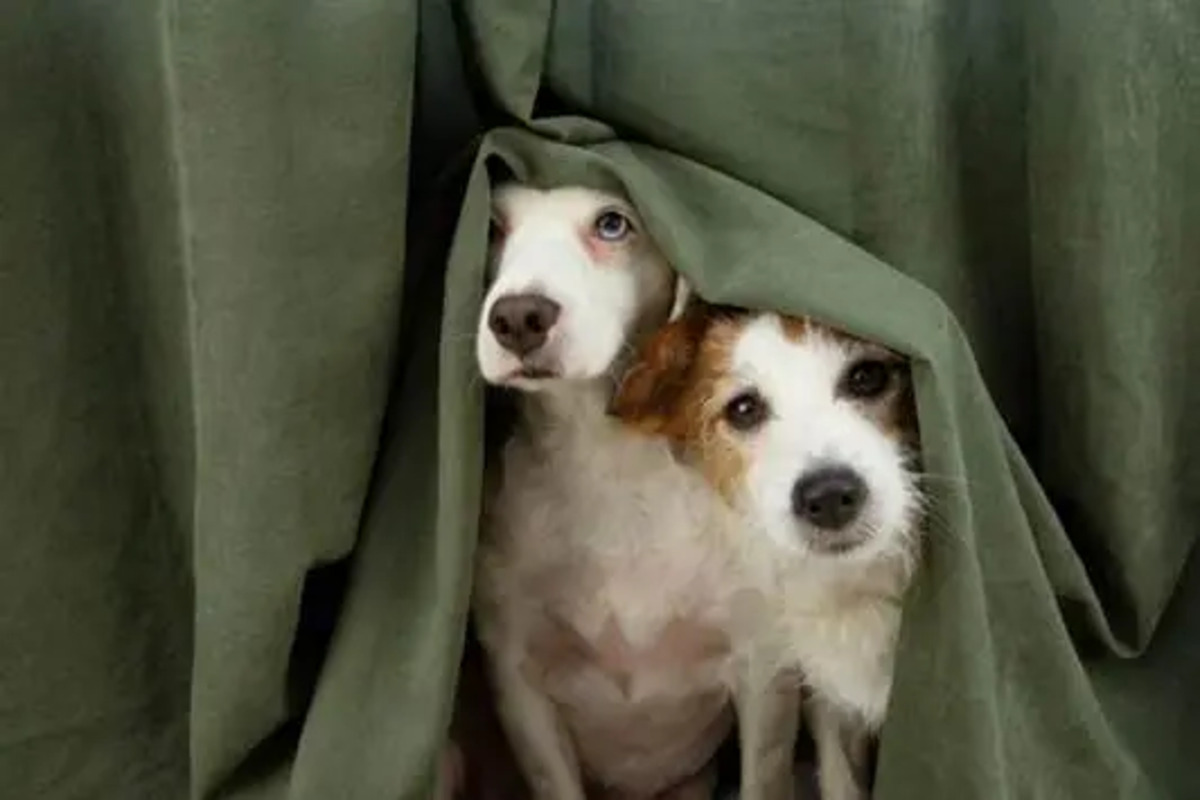For many dog owners, holidays like New Year’s Eve or the Fourth of July can be a stressful time — not because of the celebrations, but because of how their dogs react to fireworks. While we enjoy the lights and sounds, dogs often experience anxiety, confusion, and fear during these noisy events. Their hearing is far more sensitive than ours, and they don’t understand the cause of the loud, unpredictable explosions.
In this article, you’ll learn how to help your dog cope with fireworks, reduce their stress, and create a safer and more peaceful experience during noisy times.
Why dogs fear fireworks
Fireworks are sudden, loud, and unpredictable. To a dog, this can feel like a threat. Unlike thunderstorms, which build gradually and may have other cues like rain or wind, fireworks are random. There’s no warning, no pattern, and often no place to hide.
Signs that your dog is afraid of fireworks:
- Trembling or shaking
- Pacing or restlessness
- Barking or howling
- Hiding under furniture
- Drooling or panting
- Attempts to escape (scratching doors, breaking leashes, running away)
- Loss of bladder or bowel control
Some dogs even develop long-term phobias if their first experience is particularly traumatic.
Preparing in advance
Helping your dog deal with fireworks starts before the event. The more you prepare ahead of time, the better your dog can handle the stress.
Here are a few ways to get started early:
- Know the dates of fireworks events in your area so you’re not caught off guard.
- Microchip your dog and ensure their collar tags are up to date, just in case they escape.
- Create a safe space in your home where your dog can retreat and feel protected.
- Start desensitization training weeks or months in advance using low-volume firework sounds followed by rewards (more on this below).
Create a safe zone
Dogs feel calmer when they have a secure, cozy space to hide during loud events. This “den” should be:
- In a quiet room, away from windows
- Filled with familiar blankets, toys, or a dog bed
- Slightly darkened to reduce visual stimulation
- Open for your dog to enter and leave as they wish
Do not lock your dog in the space. They should feel it’s their choice to be there, not a punishment.
Use calming aids and techniques
In addition to a safe environment, you can use a variety of calming aids to help reduce your dog’s anxiety:
- White noise machines or fans to muffle the sounds
- Classical music or calming playlists designed for dogs
- Pressure wraps like Thundershirts that provide comforting pressure around the dog’s torso
- Pheromone diffusers or sprays that mimic calming maternal scents (like Adaptil)
- Lavender-scented oils (diffused in the room, never directly on the dog)
These tools work best when introduced before fireworks begin.
Stay calm and act normal
Dogs look to us for cues. If you’re panicked, overly affectionate, or jumpy, they’ll feel like something is wrong. Stay calm, behave normally, and avoid reinforcing fear.
Avoid saying “It’s okay” repeatedly in a nervous tone — this can confirm to your dog that there’s something to fear.
Instead:
- Speak in a cheerful, relaxed voice
- Encourage play if they’re open to it
- Offer treats or toys if they’re still willing to engage
- Sit nearby without forcing physical contact
Some dogs prefer to be near you; others may hide. Let them choose what feels safe.
Desensitization and counter-conditioning
For dogs with intense phobias, long-term training may help. Desensitization involves gradually exposing your dog to firework sounds at low volumes and pairing those sounds with positive reinforcement, like treats or toys.
How to do it:
- Find a high-quality audio recording of fireworks.
- Play it at a very low volume while your dog is calm.
- Reward them with treats or playtime.
- Increase volume slightly only after they show no signs of fear.
- Repeat sessions a few times a week, keeping them short and positive.
This process can take weeks or months, but it helps your dog form new associations with the sounds.
Talk to your vet if needed
If your dog has severe anxiety during fireworks, it’s worth discussing with a veterinarian. In some cases, your vet may recommend:
- Prescription anti-anxiety medication
- Natural supplements like L-theanine or CBD (vet-approved only)
- Behavioral therapy with a certified trainer or behaviorist
Never medicate your dog without veterinary guidance. Human medications like benzodiazepines or antihistamines can be dangerous if used incorrectly.
What not to do
- Don’t leave your dog alone outdoors during fireworks — it increases the risk of panic and escape.
- Don’t scold or punish fearful behavior, which only increases stress.
- Don’t force your dog to confront the noise — this can intensify the trauma.
- Don’t crate your dog unless they already love being crated and it’s their safe space.
Be your dog’s calm in the chaos
Fireworks may be beautiful for us, but they can feel like a nightmare to a dog. Your job as a responsible pet owner is to anticipate their needs, offer a safe environment, and be a source of calm.
With preparation, understanding, and care, you can help your dog feel more secure — and make holidays less stressful for both of you.

